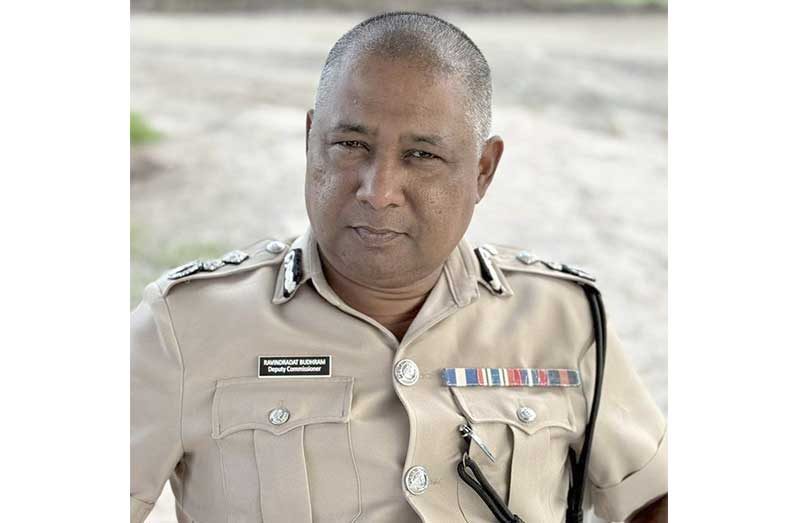– Deputy Commissioner Budhram says
– vows no cover-ups for rogue officers
IN a country where rumours of corruption have long dogged the uniform, Deputy Commissioner of Police, Ravindradat Budhram, is drawing a firm line: the Guyana Police Force (GPF) will not tolerate officers who abuse their badge.
Appearing on Safeguarding Our Nation this week, Budhram, who has served the Force for three decades in some of its toughest commands, laid out an unflinching stance on corruption as the GPF undergoes sweeping reform.
“Let’s be honest,” he said. “Some still think every police officer can be bought. But that’s simply not true, and we are proving it.”
Budhram confirmed that rogue elements have been arrested in recent months, including officers caught with illegal firearms and narcotics.
Those cases, he said, are now before the courts, and serve as an unmistakable message that wrongdoing will not be swept under the rug. “We have zero tolerance for misconduct,” he stressed. “Our job is to protect, not abuse power.”
NEW TRAINING
The fight against corruption begins, Budhram explained, with better training and recruitment. Unlike 30 years ago, when he first joined, today’s recruits must pass tests that weigh integrity, judgement, and problem-solving, not just academics. Once in the Force, every officer now undergoes mandatory ethics training.
But it’s not only about punishment, it’s about building a professional culture from the inside out. “When you create clear paths for promotion based on merit, you remove the temptation for shortcuts,” he said.
Episode 6 also highlighted how the GPF is investing in its people — and their families — to ensure officers have the support to serve with integrity. More than 600 officers have been sent for overseas training in areas such as modern investigation techniques, cybercrime and domestic violence response. Some are even pursuing legal studies abroad.
At home, the Force is rebuilding stations to include proper living quarters and providing scholarships for officers’ children. “If the family is strong, the officer is strong,” Budhram said. “That means better performance on the job, and fewer reasons to go astray.”
The push for accountability is matched by a push for representation. Budhram recalled a time when Indigenous officers were almost unheard of. Today, more than 380 Indigenous ranks are deployed throughout Regions One, Seven, Eight and Nine, bridging language and cultural divides that once hindered policing in the hinterland.
Women, too, now occupy roles across all departments, a shift from when they were an exception in uniform. “Any young woman or man who is disciplined, smart and willing can join the Force today. The door is open,” he said.
At the heart of this transformation is a shift from policing by force to policing by partnership. Across Guyana, more than 450 Community Policing Groups and over 85 youth groups are working with the GPF to tackle crime and rebuild trust. Officers are trained to defuse conflicts — especially in cases of domestic violence — with empathy and restraint.
“We don’t resolve every issue by force,” Budhram explained. “We engage. We listen.”
ACTIONS WILL MATCH WORDS
The changes aren’t just in the city. Budhram’s early days as a hinterland commander taught him how isolation, language barriers and poor transport once kept rural communities at the margins of policing. Now, 19 new patrol boats ensure riverine and interior regions have the same presence — and standards — as the coast.
“Today, there is no corner of this country that our officers can’t reach,” he said. “We are a national force, present in all ten regions, with the same commitment to every citizen.”
For Budhram, the message is simple but non-negotiable: a police force worthy of trust demands more than uniforms and patrols — it demands honesty, accountability and community. And while there’s a long road ahead, he believes the signs of change are real.
“At the end of the day, our actions matter more than our words,” he said. “We want Guyanese to see that we’re serious about protecting them — and protecting the integrity of this uniform.”



.jpg)








